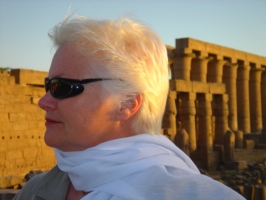When can you let down your guard when you travel? In your hotel room? On public transport? At passport control? When you’re in a group? Never?
The tea was hot, the cream seemed fresh as I shared my digestives with Alec, the terrorist. I’d been waiting for him in the Dover tea shop for twenty minutes, and now we sat huddled in a booth, our backpacks slumped against the wall. We poured tea into cups and ate the sweet, graham-crackery biscuits like grateful refugees.
I was glad to be back in an English-speaking country. In Salerno, Italy, I’d seen the headline, “E MORTO IL PAPA!” It was August of 1978 and Pope Paul VI had just died. People would be rushing to Rome and St. Peter’s Square; it was time to hightail it home. Alec stroked his teacup, keeping his eyes on the table.
“Did you have some trouble at passport control?” I said. “You were so late, I . . .”
“Yes, I had a lot of bloody trouble at passport control. The buggers strip-searched me.”
“What are you talking about?” I’d never heard of strip-searching.
“They’re British, and I’m from Belfast, so they thought I must be carrying a bomb. I had to take off all my clothes, and they fingered me all over. That’s what I’m talking about.”
He pulled another digestive from the wrapper and snapped the biscuit in half. The tea shop was quiet. Alec sat chewing. The street down the hill to the ocean was dappled in sunlight. People lay on the pebbly beach on huge, striped towels. A phone rang in the back of the shop.
Days before, back in Paris, I was heading for London when I’d met Alec in the sweltering Gare du Nord waiting room. It was midnight, and a knot of sullen Algerian laborers slouched in the other chairs. They never spoke, never seemed to close their eyes, just watched us. The next train to Calais wouldn’t leave for seven more hours, so we took turns using the bathroom, guarding each other’s seats and packs. Alec brought me rolls and coffee without asking, me falling all over myself with thanks like he’d made Christmas dinner.
Alec poured another sugar packet into his tea.
“They asked me if I’d gotten a leg over you,” he said.
“Who did? Whose leg?” Couldn’t he just speak normal English?
“The bloody policemen. They asked if we’d had sex.”
I gripped my cup and looked away. The cops must have watched us as we left the boat and separated at passport control. I’d been so relieved to leave Paris, get on the train, and return to England. I’d finally felt safe. I’d counted on Alec to keep me away from the Algerians at the train station. Now it turned out he was the one who needed protecting. When are you finally safe out on the road? I suddenly didn’t want to travel anymore: no more politics, police, popes dying, former colonials raging, differentness.
Alec looked up at me, his eyes red, humiliated, furious. “My next trip out,” he whispered, “ I bloody will be carrying a bomb.” It was a statement too big for either of us. We finished our tea, staring out the window, the shop phone ringing again with no one answering. We stood and murmured goodbyes. He shouldered his rucksack and headed for a bus to Brighton, where he said he knew somebody. I cinched the straps of my backpack and headed for my train to London. A cop watched us.

Post a Comment